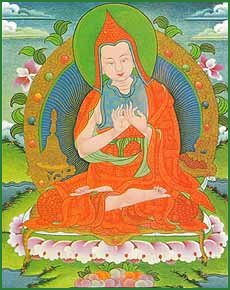The Great Chariot
by Longchenpa | 268,580 words
A Commentary on Great Perfection: The Nature of Mind, Easer of Weariness In Sanskrit the title is ‘Mahāsandhi-cittā-visranta-vṛtti-mahāratha-nāma’. In Tibetan ‘rDzogs pa chen po sems nyid ngal gso’i shing rta chen po shes bya ba ’...
Part 9 - The teaching of the stages by which beings should practice this
Now the third of the above points, guarding by practicing what is to be practiced is taught. From the two sections of the individuals by whom this is practiced and how it should be practiced, as for the first:
As for the buddha-sons, there are three kinds of them:
Some have freed themselves and desire to free all beings.
These are the bodhisattvas, who are like a king.
Some want liberation for both themselves and beings.
These are the bodhisattvas who are like a helmsman;
Some free beings and then desire their personal peace.
These are the bodhisattvas who are like a shepherd.
It is taught in the sutras that these are liberated,
In thirty-three measureless kalpas, in seven, and in three,
Respectively, in accord with their powers of gaining that.
In “arousing the bodhicitta of the great desire of a bodhisattva,” after first having become enlightened ourselves, later we free beings; for example, as a king, having attained a kingdom, desires to establish his subjects in happiness. Arousing such bodhicitta like that of Mañjushri is explained in many sutras.
The desire to liberate oneself and other beings equally is called “arousing the bodhicitta of true wisdom.” The passengers in one’s boat and oneself as helmsman equally want to go to the other side of the river.
First having liberated sentient beings, desiring to liberate oneself primordially, is called “the incomparable arousing of bodhicitta.” It is like shepherds of sheep, goats, and oxen, who, when they see narrow defiles and fearful places, or else when in front of them these animals have entered them, do not leave even one behind. This is arousing bodhicitta for sentient beings like that of Mañjushri and Shakyamuni.
Here those of dull powers take thirty-three and the middling seven, and the sharpest three lifetimes to perfect unsurpassable enlightenment. The Jewel Heap Sutra says:
Those arousing the bodhicitta of the great desire will be liberated from samsara in thirty-three countless kalpas. Those who arouse the bodhicitta of true wisdom will reach it in seven. By arousing the incomparable bodhicitta, they will become completely enlightened in three inconceivable kalpas. Why so? Because they have powers that are small, middling, and great. They are, for example, like a universal monarch, the pilot of a ship, and a herdsman.
Thus, and so forth it is extensively taught.
